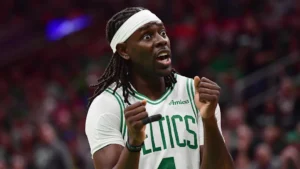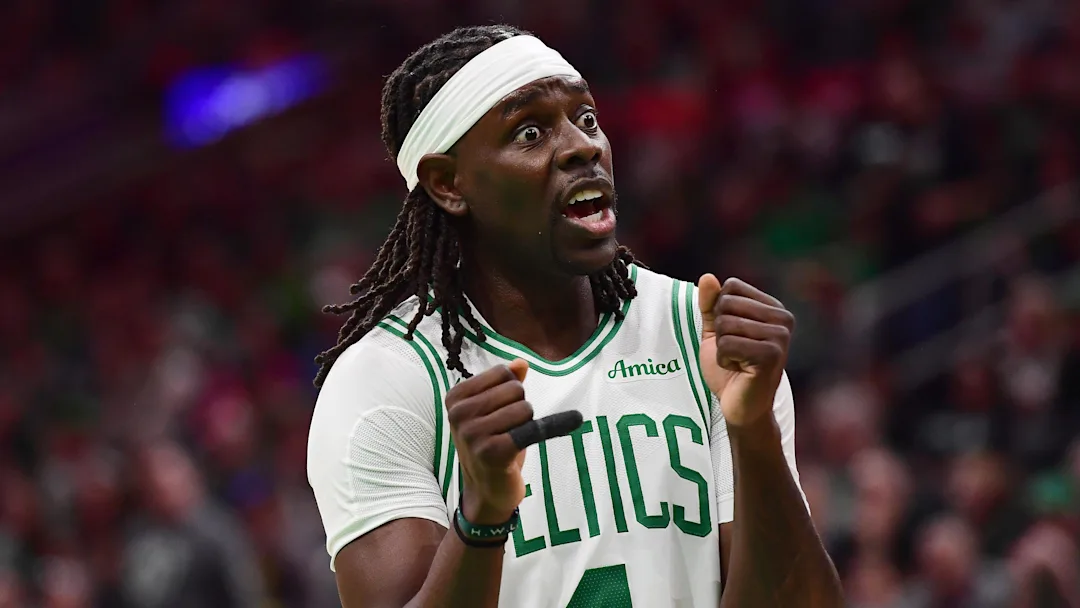
image source https://www.si.com/jrue-holiday-trade-grades-how-did-celtics-trail-blazers-fare
Mental toughness is not just about being strong; it’s about staying calm in pressure, bouncing back from failure, and pushing forward when it hurts the most. If there’s one NBA team that has shown mental toughness consistently over decades, it’s the Boston Celtics. From their early days of building a basketball dynasty to the modern era of playoff battles, the Celtics have embodied grit, focus, and unbreakable spirit.
This article explores the concept of mental toughness through the story of the Boston Celtics. We’ll break down what mental toughness really means, how the Celtics have practiced it on and off the court, and how you can apply these lessons in your own life—whether you’re a student, athlete, office worker, or entrepreneur.
1. What Is Mental Toughness?
Mental toughness is the ability to stay strong, focused, and confident in difficult situations. It’s about:
Staying calm under pressure
Bouncing back from setbacks
Showing discipline and focus
Believing in yourself when things go wrong
Staying consistent even when motivation is low
In sports, mental toughness often separates good players from great ones. Talent and skills are important, but mindset wins championships. And no team proves this better than the Boston Celtics.
2. A Legacy of Mental Strength: The History of the Boston Celtics
The Boston Celtics are one of the oldest and most successful teams in the NBA. Since their founding in 1946, they have built a legacy around winning, hard work, and team spirit.
Early Years – Bill Russell and the 1960s Dynasty
One of the best examples of mental toughness in NBA history is Bill Russell. He led the Celtics to 11 championships in 13 seasons during the 1950s and 1960s. Russell was not just a great defender and rebounder; he was a mental warrior.
He faced racism, pressure, and criticism, but never let it break him. He focused on team success over personal fame. His calm leadership and strong mindset made the Celtics unbeatable.
Practical Takeaway: Like Russell, focus on what you can control. Block out negativity. Choose teamwork over ego.
3. The Larry Bird Era – Grit, Rivalry, and Fierce Focus
In the 1980s, the Celtics became dominant again with Larry Bird, Kevin McHale, and Robert Parish. Larry Bird was not the fastest or most athletic player—but his mental toughness was off the charts.
He was known for playing through pain, talking trash to opponents, and hitting impossible shots in pressure moments. He practiced harder than anyone and had extreme self-belief.
Bird once played with both ankles heavily taped due to injury and still scored 34 points in a playoff game.
Practical Takeaway: You don’t need to be perfect—you need to outwork and out-focus others. Keep practicing even when you’re tired.
4. Comeback Culture: The 2008 Championship
By the early 2000s, the Celtics had struggled for years. But in 2007, everything changed when they formed a new “Big Three”: Paul Pierce, Kevin Garnett, and Ray Allen.
This team showed the mental toughness of mature veterans hungry for victory.
Paul Pierce played through injuries and was known as “The Truth” for his clutch performances.
Kevin Garnett brought unmatched intensity, constantly motivating teammates.
Ray Allen trained obsessively, taking thousands of practice shots even when no one was watching.
They came together with one goal: win a championship. In 2008, they did exactly that, defeating their longtime rivals, the Los Angeles Lakers.
Practical Takeaway: Never give up on your goals. Sometimes, it takes years of preparation and the right team to succeed. Keep going.
5. The Bubble and Beyond – 2020s Mental Challenges
The 2020 pandemic tested the mental health of players in every sport. The Celtics had to play in the NBA “bubble” — an isolated camp in Orlando without fans, family, or normal life. It required a whole new level of emotional resilience.
Players like Jayson Tatum and Jaylen Brown stepped up. They not only competed under strange conditions but also spoke up about social justice, racism, and mental health. This showed the importance of mental strength both on and off the court.
Practical Takeaway: Mental toughness also means taking care of your emotions, asking for help, and standing up for what’s right.
6. Current Roster: Young Talent and Growth Mindset
The Celtics today are built around young stars like Jayson Tatum, Jaylen Brown, and veterans like Jrue Holiday (until recently). These players train hard, bounce back from playoff losses, and continue to grow mentally.
Tatum once scored 51 points in a Game 7 after facing criticism all season. He didn’t let the pressure break him.
Brown overcame injuries and doubters to become an All-Star.
The team regularly reviews game footage and meditates to stay mentally focused.
Practical Takeaway: Learn from your losses. Use feedback. Develop a growth mindset. Your future self depends on today’s effort.
7. What We Can Learn from the Celtics About Mental Toughness
A. Control the Controllables
You can’t control how others treat you, but you can control your response. Celtics players always focus on defense, communication, and effort—things in their control.
You can do the same: Focus on your behavior, not the situation.
B. Push Through the Pain
Many Celtics have played through injury, pain, and personal loss. That doesn’t mean ignoring self-care—it means choosing courage over comfort.
Example: When Larry Bird had back problems, he adapted his game. He didn’t quit.
You can do the same: When tired, take a break—but keep your goal alive.
C. Believe When No One Else Does
The Celtics have had seasons where media and fans gave up on them. But internally, they kept believing.
You can do the same: Block out doubt. Trust your preparation. Your confidence is your responsibility.
D. Stay Humble and Hungry
Even after winning 18 championships, Celtics teams are never satisfied. They keep improving.
You can do the same: Don’t rest after one success. Use it as a stepping stone.
8. Practical Exercises to Build Mental Toughness Like a Celtic
You don’t need to be a basketball player to build mental toughness. Here are daily habits inspired by the Celtics:
1. Daily Mindset Check
Ask yourself: “What challenge can I face today with calm?”
Visualize success in tough situations.
2. Set a Grit Goal
Pick one task that feels hard (writing, exercising, studying).
Do it for 30 minutes, even when you don’t feel like it.
3. Reflect After Failure
What did I learn?
How can I improve next time?
What can I be proud of?
4. Practice Under Pressure
Simulate pressure: Give yourself a deadline or perform in front of someone.
Learn to stay calm.
5. Self-Talk Training
Use positive phrases: “I can handle this,” “I’ve been through worse.”
Avoid negative words like “I can’t,” “I’m bad at this.”
9. Mental Health and Mental Toughness: Not the Same, but Connected
It’s important to understand that mental toughness is not ignoring emotions. True strength includes emotional awareness.
The Celtics have supported mental health awareness in recent years. Many NBA players now talk openly about anxiety, stress, and therapy. That’s part of toughness too—being brave enough to ask for help.
“Mental health is just as important as physical health,” said Jaylen Brown in a recent interview.
10. Conclusion: Think Like a Celtic
The Boston Celtics have shown that mental toughness is not something you’re born with—it’s built over time. Through challenges, losses, and big wins, they’ve proven that attitude beats talent when talent gives up.
To live like a Celtic:
Stay focused under pressure.
Keep working even when no one watches.
Bounce back when you fall.
Train your mind daily.
Stand up for what you believe in.
Whether you’re a student preparing for exams, a parent managing stress, or an athlete chasing dreams—mental toughness can transform your life. And if the Celtics have taught us anything, it’s this:
Champions aren’t made on the court. They’re made in the mind.
How Yoga Improves Mental Health – A Simple and Deep Understanding

Leave a Reply